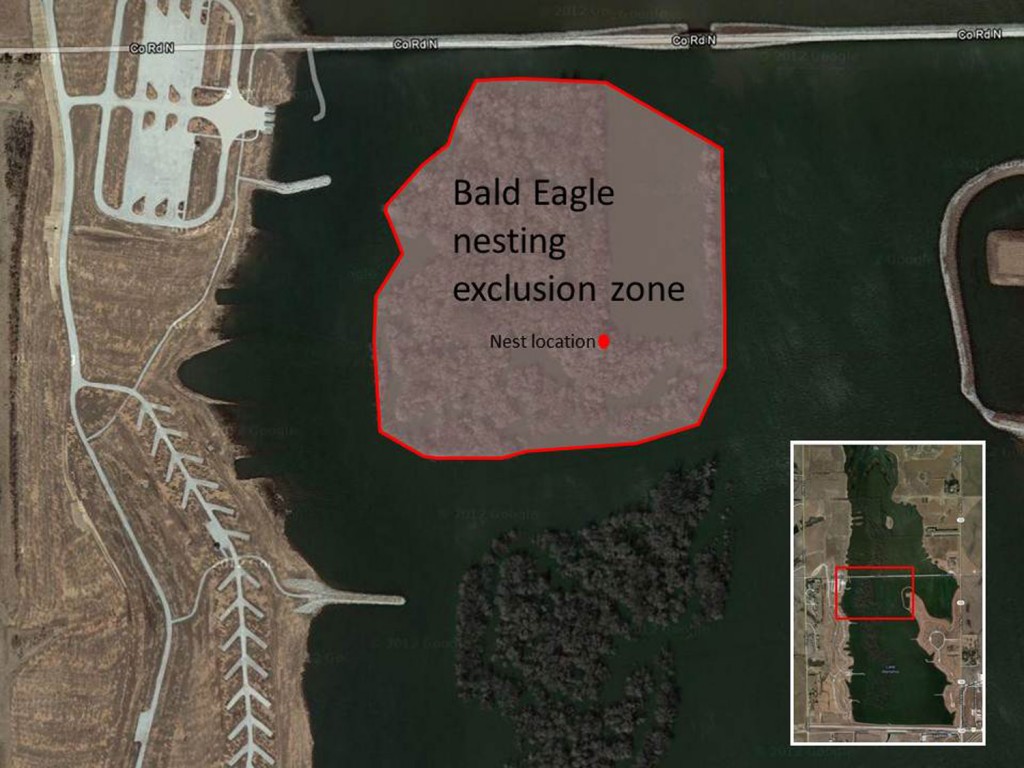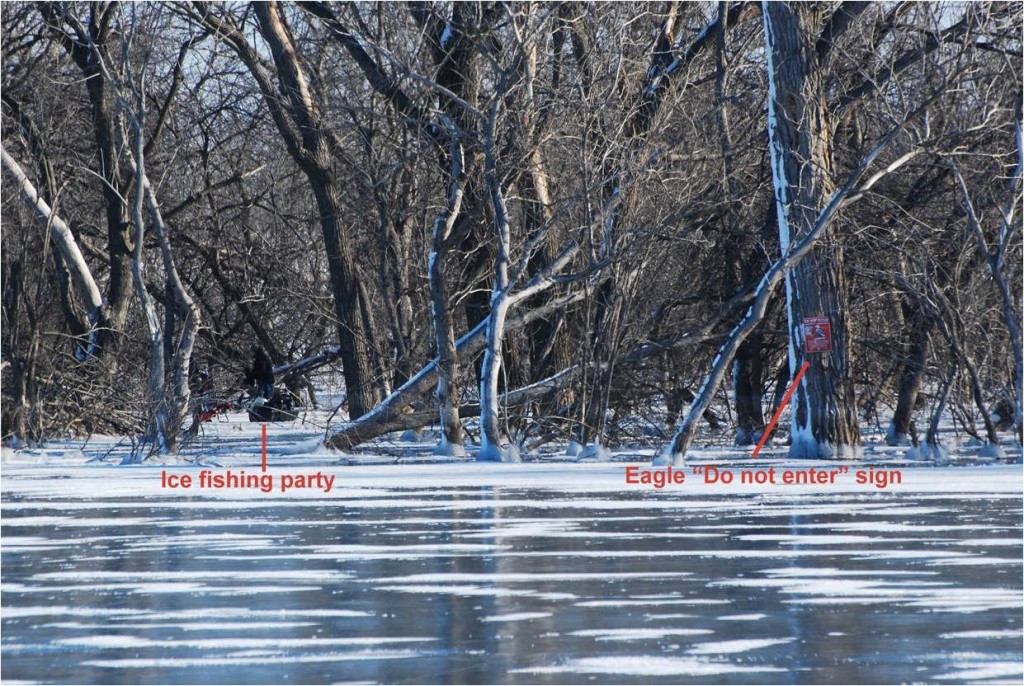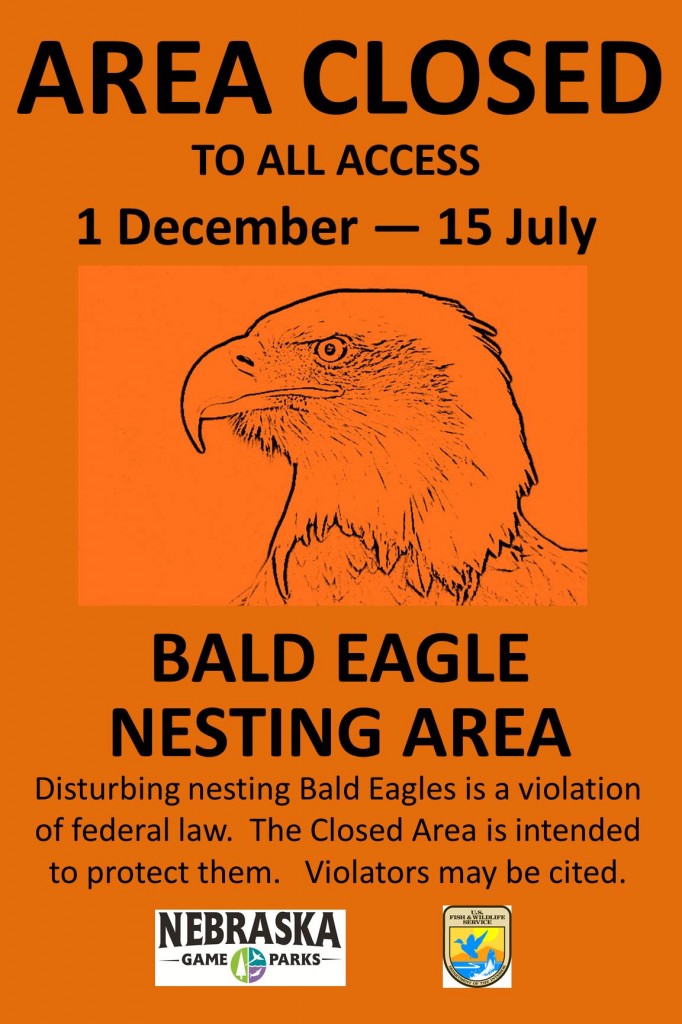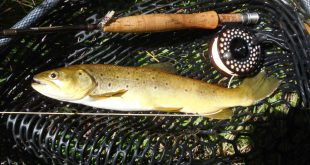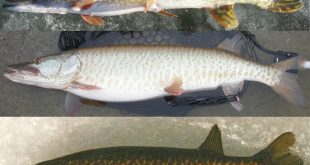This news release went out late last Friday, but let me bring it up again as a reminder:
Lake Wanahoo SRA Visitors Asked to Comply with Bald Eagle Exclusion Zone
January 11, 2013 News No CommentsLINCOLN, Neb. – Ice anglers and other visitors to Lake Wanahoo State Recreation Area (SRA) are asked to comply with an exclusion zone implemented to protect the lake’s nesting bald eagles. The exclusion zone is an area closed to all access from Dec. 1-July 15.
A pair of bald eagles first built a nest at Lake Wanahoo in 2011. They produced two fledglings in 2011 and two more the following year. The nest is located in a large, dead cottonwood in the lake near the boat ramp.
Bald eagles are particularly sensitive to disturbance during the early portion of their breeding cycle, which includes courtship, nest building and maintenance, and egg-laying. Bald eagles may begin courtship or nesting building activity as early as December or January, but activity increases in February and the first eggs are usually laid by early March.
Bald eagles incubate their eggs for about 35 days. The chicks grow quickly, but it will take another 70-90 days for the chicks to fledge. Once fledged, they will still remain near the nest and dependent on their parents for some time.
“We are asking our SRA visitors to help us protect these magnificent birds,” said Joel Jorgensen, nongame bird program manager with the Nebraska Game and Parks Commission. “Hopefully, the resident breeding pair will return to their nest very soon and begin breeding activities.”
Bald eagles are protected by the federal Bald and Golden Eagle Protection Act, which prohibits anyone, without a permit, from “taking” bald eagles, including their parts, nests, or eggs. “Taking” includes killing or harming bald eagles but also includes disturbing nesting bald eagles. A violation of the Act can result in a fine, imprisonment for one year, or both, for a first offense. Penalties increase substantially for additional offenses, and a second violation of this Act is a felony. Individuals who observe violations may call the Nebraska Wildlife Crimestoppers at 402-742-7627.
The Lake Wanahoo eagle nest also offers excellent wildlife viewing opportunities. The nest can be seen from several different areas around the SRA and is easily viewed with binoculars or a spotting scope.
To be more specific, here is the area of Lake Wanahoo that is closed to angler access:
Now, you all know that I am an avid angler and I am always saying that we need every bit of public fishing water that we can get in Nebraska! So, anytime anyone is talking about taking some angler access away, I get defensive. But in this case, this is necessary. Here is why:
Bald Eagle Management Guidelines and Conservation Measures
The Bald and Golden Eagle Protection Act
The Bald and Golden Eagle Protection Act (16 U.S.C. 668-668c), enacted in 1940, and amended several times since then, prohibits anyone, without a permit issued by the Secretary of the Interior, from “taking” bald eagles, including their parts, nests, or eggs. The Act provides criminal penalties for persons who “take, possess, sell, purchase, barter, offer to sell, purchase or barter, transport, export or import, at any time or any manner, any bald eagle … [or any golden eagle], alive or dead, or any part, nest, or egg thereof.” The Act defines “take” as “pursue, shoot, shoot at, poison, wound, kill, capture, trap, collect, molest or disturb.”
For purposes of these guidelines, “disturb” means: “to agitate or bother a bald or golden eagle to a degree that causes, or is likely to cause, based on the best scientific information available, 1) injury to an eagle, 2) a decrease in its productivity, by substantially interfering with normal breeding, feeding, or sheltering behavior, or 3) nest abandonment, by substantially interfering with normal breeding, feeding, or sheltering behavior.”
In addition to immediate impacts, this definition also covers impacts that result from human-induced alterations initiated around a previously used nest site during a time when eagles are not present, if, upon the eagle’s return, such alterations agitate or bother an eagle to a degree that interferes with or interrupts normal breeding, feeding, or sheltering habits, and causes injury, death or nest abandonment.
A violation of the Act can result in a fine of $100,000 ($200,000 for organizations), imprisonment for one year, or both, for a first offense. Penalties increase substantially for additional offenses, and a second violation of this Act is a felony.
I know if you go to Lake Wanahoo today and look, there probably will not be any eagles in the nest. I also know that those eagles nested there during the construction of the reservoir. But, the rules are very clear and the eagles may soon again be back to use the nest this year. I expect there will be some grumbling about this, especially from some anglers who may have caught fish from that area recently:
Please, if you fish Lake Wanahoo, be aware of the eagle’s nest and that you need to stay out of that area from now until July 15. There is a lot of other water at Lake Wanahoo that holds lots of fish; the area under the eagle’s nest is NOT the only place you can catch ’em. Give the eagles their space and let a few fish have a refuge in that area for awhile too! Thanks!
 Nebraskaland Magazine
Nebraskaland Magazine
